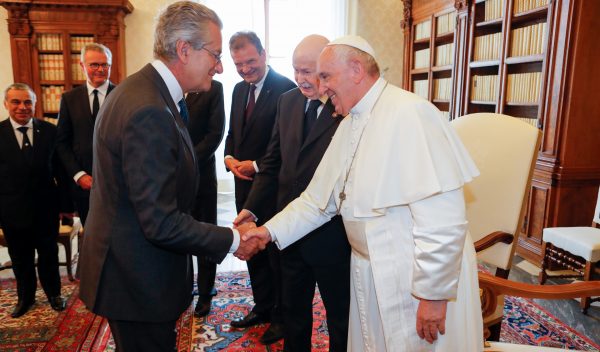Relations with the Holy See
 The Order of Malta’s relations with the Holy See are unique and very special. They are determined by the sovereignty of the Order and the independence of all political and administrative decisions, as well as by the fact that the Order of Malta is one of the oldest religious Orders of the Catholic Church.
The Order of Malta’s relations with the Holy See are unique and very special. They are determined by the sovereignty of the Order and the independence of all political and administrative decisions, as well as by the fact that the Order of Malta is one of the oldest religious Orders of the Catholic Church.
The Order’s Embassy to the Holy See therefore maintains frequent and positive contacts with the Secretariat of State, in particular the Section for Relations with States, and with numerous Congregations of the Roman Curia, in particular the Congregation for Institutes of Consecrated Life and Societies of Apostolic Life.
The interests of the Order of Malta, determined by the intrinsic nature and charisma of the Order, often coincide with those of the Apostolic See, and the Embassy’s task is to seek synergies and explore the possibility of joint action both multilaterally and bilaterally. To this end, the Dicasteries with which the most frequent contacts take place are the Congregation for the Oriental Churches; the Dicastery for the Service of Integral Human Development; the Congregation for the Evangelization of Peoples; the Pontifical Council for Culture; the Pontifical Council for Promoting Christian Unity; the Pontifical Council for Interreligious Dialogue; and the Pontifical Academy for Life and Social Sciences.
The Embassy of the Order of Malta to the Holy See also assures an assiduous presence at the Eucharistic Celebrations presided over by the Holy Father and at international and/or cultural and social events.
Intense and frequent relations are also maintained with the other Diplomatic Missions to the Holy See, the Orders and Religious Movements in the territory.
Recently, the Embassy has been involved in assisting the Pilgrimages organized by the Order of Malta on an international scale, which bring hundreds of faithful of all ages and nationalities to Rome, most of whom are wheelchair-bound. The intervention of the Embassy has facilitated on several occasions the obtaining of tickets to attend the Papal Audiences and Ceremonies or to access the Vatican Museums, and has acted as an intermediary with the Vatican Departments to facilitate the movement of dozens of coaches and groups of sick people within the Vatican State.
In spite of the forced blocking of many activities and moments of meeting, the relations between the Order’s Embassy to the Holy See and the Vatican representatives did not fail but, on the contrary, adapted to the new forms of communication and sociality, maintaining mutual esteem and cooperation.
